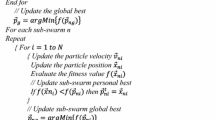Abstract
Inspired by the phenomenon of symbiosis in natural ecosystem, a master-slave mode is incorporated into Particle Swarm Optimization (PSO), and a Multi-population Cooperative Optimization (MCPSO) is thus presented. In MCPSO, the population consists of one master swarm and several slave swarms. The slave swarms execute PSO (or its variants) independently to maintain the diversity of particles, while the master swarm enhances its particles based on its own knowledge and also the knowledge of the particles in the slave swarms. In the simulation part, several benchmark functions are performed, and the performance of the proposed algorithm is compared to the standard PSO (SPSO) to demonstrate its efficiency.
Preview
Unable to display preview. Download preview PDF.
Similar content being viewed by others
References
Eberchart, R.C., Kennedy, J.: A new optimizer using particle swarm theory. In: Proceeding of the 6th international symposium on Micromachine and Human Science, Nagoya, Japan, pp. 39–43 (1995)
Kennedy, J., Eberhart, R.C.: Particle Swarm Optimization. In: Proceeding. of IEEE International Conference on Neural Networks, Piscataway, NJ, pp. 1942–1948 (1995)
Eberchart, R.C., Shi, Y.: Particle swarm optimization: developments, applications and resources. In: Proceedings of the IEEE Congress on Evolutionary Computation, Piscataway, NJ, pp. 81–86 (2001)
Kennedy, J., Eberhart, R.C., Shi, Y.: Swarm intelligence. Morgan Kaufmann Publishers, San Francisco (2001)
Angeline, P.J.: Evolutionary optimization versus particle swarm optimization: philosophy and performance difference. In: Proceeding of the 7th Annual Conference on Evolutionary Programming, San Diego, California USA, pp. 601–610 (1998)
Richards, M., Ventura, D.: Dynamic sociometry in particle swarm optimization. In: International Conference on Computational Intelligence and Natural Computing, Cary, North Carolina, USA, pp. 1557–1560 (2003)
Kennedy, J., Mendes, R.: Population structure and particle swarm performance. In: Proceedings of the Congress on Evolutionary Computation, Honolulu, Hawaii, pp. 1671–1676 (2002)
Kennedy, J., Mendes, R.: Neighborhood topologies in fully-informed and best-of neighborhood particle swarms. In: Proceedings of the 2003 IEEE SMC Workshop on Soft Computing in Industrial Applications, Binghamton, New York, pp. 45–50 (2003)
Krink, T., Vestertroem, J.S., Riget, J.: Particle swarm optimization with spatial particle extension. In: Proceedings of the IEEE Congress on Evolutionary Computation, Honolulu, Hawaii, pp. 1474–1479 (2002)
Riget, J., Vesterstroem, J.S.: A diversity-guided particle swarm optimizer – the ARPSO. Technical Report 2002-02, Department of Computer Science, University of Aarhus (2002)
Løvbjerg, M.: Improving particle swarm optimization by hybridization of stochastic search heuristics and self-organized criticality. Master’s thesis, Department of Computer Science, University of Aarhus (2002)
Angeline, P.J.: Using selection to improve particle swarm optimization. In: Proceedings of the 1998 IEEE Congress on Evolutionary Computation, Piscataway, NJ, pp. 84–89 (1998)
Shi, Y., Eberhart, R.C.: Parameter selection in particle swarm optimization. In: proceeding of the 7th annual conference on Evolutionary Programming, San Diego, California, USA, pp. 591–600 (1998)
Clerc, M., Kennedy, J.: The particle swarm: Explosion, stability, and convergence in a multidimensional complex space. IEEE Transactions on Evolutionary Computation 6, 58–73 (2002)
Moriartv, D.: Miikkulainen: Reinforcement learning through symbiotic evolution. Machine learning 22, 11–32 (1996)
Wiegand, R.P.: An analysis of cooperative co-evolutionary Algorithms. PhD thesis, George Mason University, Fairfax, Virginia (2004)
Shi, Y., Ebrehart, R.C.: A modified particle swarm optimizer. In: Proceeding of the1998. IEEE International Conference on Evolutionary Computation, Piscataway, NJ, pp. 69–73 (1998)
Shi, Y., Eberhart, R.C.: Empirical study of particle swarm optimization. In: proceedings of the 1999 IEEE Congress on Evolutionary Computation, Piscataway, NJ, pp. 1945–1950 (1999)
Author information
Authors and Affiliations
Editor information
Editors and Affiliations
Rights and permissions
Copyright information
© 2005 Springer-Verlag Berlin Heidelberg
About this paper
Cite this paper
Niu, B., Zhu, Y., He, X. (2005). Multi-population Cooperative Particle Swarm Optimization. In: Capcarrère, M.S., Freitas, A.A., Bentley, P.J., Johnson, C.G., Timmis, J. (eds) Advances in Artificial Life. ECAL 2005. Lecture Notes in Computer Science(), vol 3630. Springer, Berlin, Heidelberg. https://doi.org/10.1007/11553090_88
Download citation
DOI: https://doi.org/10.1007/11553090_88
Publisher Name: Springer, Berlin, Heidelberg
Print ISBN: 978-3-540-28848-0
Online ISBN: 978-3-540-31816-3
eBook Packages: Computer ScienceComputer Science (R0)




